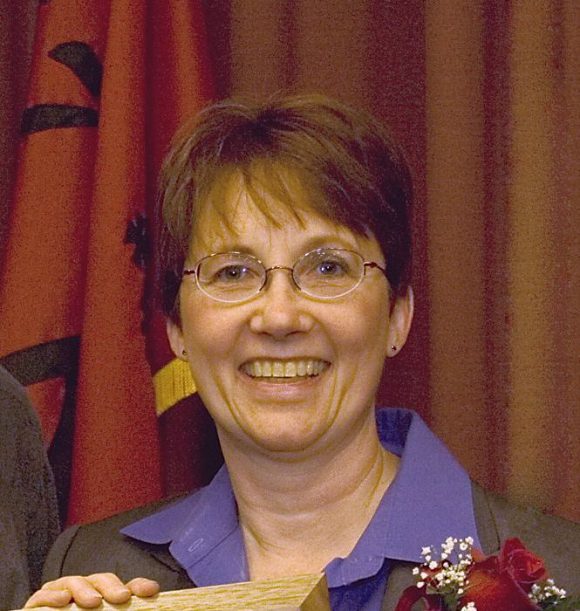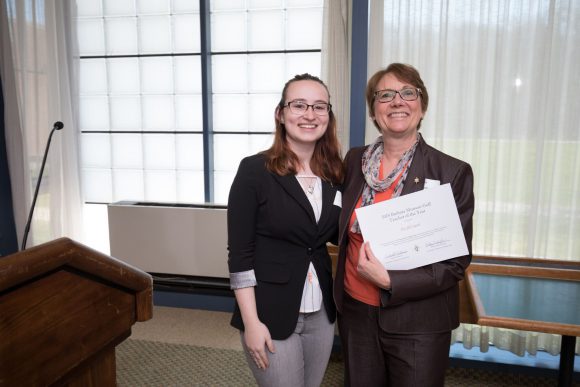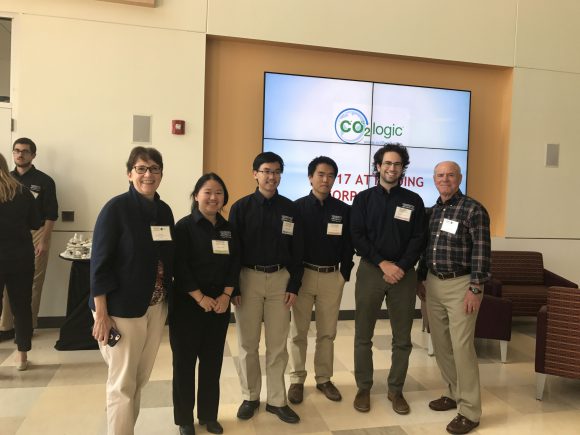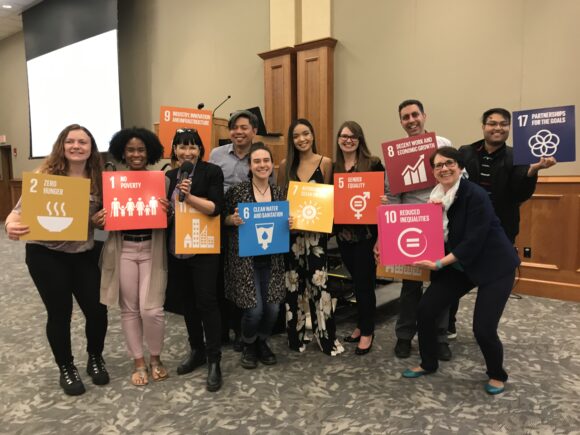
Dr. Jill Lipoti.
At a transformative period at the school tied to the theme of sustainability, Jill Lipoti (CC’77, GSNB’85 – Ph.D. in environmental science) was in the proverbial right place at the right time. She played a crucial role in the development and implementation of a new academic Minor in Sustainability. Because of her work experience and her interest in applying the concepts of sustainability to all aspects of work and life, she was hired to teach the inaugural courses of the minor in 2016, in the academic home of Human Ecology. The minor is open to students across Rutgers-New Brunswick in majors spanning areas ranging from science (including social science) to engineering to economics.
As a teaching professor at Rutgers through 2020, part of Jill’s teaching style was to integrate sustainability in the larger university setting. She became a member of the Rutgers Sustainability Committee, which is responsible for organizing and articulating sustainable practices and principles in education and research, to empower her students to engage with the faculty and administration. Crucially, the committee also works towards reducing the impact of the university’s operations on the environment, and here again Jill’s students were able to create a sustainability page on the university website that contained a walking tour of the sustainable elements such as rain gardens, pervious pavement, solar installations, geothermal heating/cooling, and food waste minimization.
Inspired by her students’ enthusiasm for sustainability and her passion for experiential learning, Jill brought “experiences” to the Sustainability curriculum.
Her students have remarked that they will never forget cricket cookies made with cricket flour (very high protein); lessons with Legos; field trips to Duke Farms, Hackensack Meadowlands, and the Joint Meeting sewage treatment plant; tastings of “Toast” (beer made from food waste!) and many more activities that combined environmental solutions with social outcomes.

Alpha Zeta student Gabrielle DiIenno with Jill Lipoti, winner of the 2018 Barbara Munson Goff ‘Teacher of the Year’ Award. Photo: Christopher Flanegan.
While an undergraduate at Cook College, Jill was part of the Alpha Zeta chapter, and in 2018 she was delighted to be selected as the honor fraternity’s “Teacher of the Year” in recognition of her role as an outstanding teacher and change maker.
A part of the historic 1973 matriculating class at Cook College, Jill recalls taking ‘English Composition’ in 1975 with the late Barbara Goff, a beloved AZ alumna and for whom the fraternity’s “Teacher of the Year” award was named in 2009. Jill has been a fan of Dr. Goff’s inspirational teaching style since that class, and credits Dr. Goff as a mentor and as the inspiration for her own teaching approach, which she describes this way:
“I see sustainability as a meta-discipline, which requires the development of a complex set of skills. My goal in teaching ‘Intro to Sustainability’ was for my students to consider sustainability in every action in their lives. If they spill yogurt on the kitchen counter, I want them to consider whether they should wipe it up with a sponge, a paper towel, or a cloth. What are the implications for water usage? Energy usage? Waste generation?”

Left to right: Jill Lipoti, then sustainability advisor and teaching professor, Department of Human Ecology, with four of the five Rutgers student interns: Denia Cai Shi (SEBS); Dustin Wang (SEBS); Daniel Um (School of Engineering); Landen Naphtali (School of Engineering). At right is Henry John-Alder, professor, Department of Ecology, Evolution, and Natural Resources at the 2017 Green Teams summer internship program.
Jill taught a total of three courses in the minor, two of which were required courses. ‘Intro to Sustainability’ being one, and the other, a practicum in which she used a different approach.
“In the Sustainability Practicum class, I stepped back and allowed the students to develop their leadership potential. My teaching philosophy for the practicum was “Figure it out!” They were taught the importance of partnership, participation, teamwork, deadlines and budgets. Their pride in the outcome of their projects was my reward.”
Jill was fully committed to student experiences in sustainability. In 2017, she shepherded five Rutgers students who participated in a ten-week interdisciplinary Green Teams summer internship program of the PSEG Institute for Sustainability Studies at Montclair State University. Under the paid internship program, 45 students from 10 universities were hired to help develop sustainable solutions for waste management. The Green Team program continues today at the PSEG Institute for Sustainability Studies and is open to Rutgers students in the summer.
Within the Practicum, Jill’s students spearheaded the conference series, “RU Sustainable” that began at the Cook Student Center in 2017 and continued to 2019. This major series helped to spur ideas for sustainability at Rutgers and enabled students and faculty to connect with the U.N. Sustainable Development Goals through service, education, research and the arts. With more than 200 participants at each event, students and faculty embraced the framework of the 17 global goals as the unifying theme for collective action, specifically how they could be used to promote sustainability at Rutgers in four “CORE” areas: Curriculum, Operations, Research and Engagement.

Jill Lopoti, at right, with Rutgers students at an ‘RU Sustainable’ event on the Camden campus.
A loyal alumna, Jill earned three degrees in environmental science from Rutgers – bachelor’s, master’s, and doctorate – earning the recognition of her alumni peers in 2007 with the George H. Cook Distinguished Alumni Award presented by the Cook Community Alumni Association to undergraduate alumni for their outstanding accomplishments in professional or volunteer work.
Alongside her teaching and mentorship of students at Rutgers, Jill enjoyed a long and distinguished career with the New Jersey Department of Environmental Protection (NJDEP), retiring in 2013 as the Director of the Division of Water Monitoring and Standards, with responsibility for fresh water and marine water monitoring efforts. One of her responsibilities was to oversee the AmeriCorps Watershed Ambassador program – to inspire the next generation of water pollution control professionals. She was also the Goal Owner for the Barnegat Bay Action Plan, one of the Governor’s priorities for improving water quality.
She previously served as the Director of the Division of Environmental Safety and Health at NJDEP with responsibility for directing the state’s radiation protection programs, quality assurance, release prevention, pollution prevention and right-to-know programs.
Jill has participated in nuclear emergency response planning and led an effort to improve planning for recovery from a nuclear accident. Under her direction, the effectiveness of the x-ray inspection program was improved through emphasizing the importance of measuring radiation exposure and image quality.
A seasoned professional, Jill earned multiple national recognitions, including being elected Chairman of the Conference of Radiation Control Program Directors and a member of the National Council of Radiation Protection in 2001, a non-profit organization comprised of the top 100 radiation scientists in the U.S.
Now retired and living on Whidbey Island in Puget Sound, WA, Jill is vice chair of the Island County Marine Resources Committee, an advisory body to county commissioners, and leading citizen science research in kelp, forage fish, and near shore restoration projects.
Jill credits Cook College and her illustrious classmates with sparking the curiosity that led to these diverse interests that all relate to environmental science. The foundational principles of the interconnectedness of social, environmental, and economic interests were part of the Cook College curriculum. From the meadowlands of New Jersey, to the feeder bluffs of Whidbey Island, the linkages of geology to culture that demonstrate the breadth of the Rutgers experience have brought wonder and fulfillment to Jill’s life.

